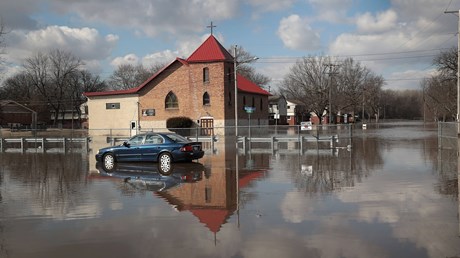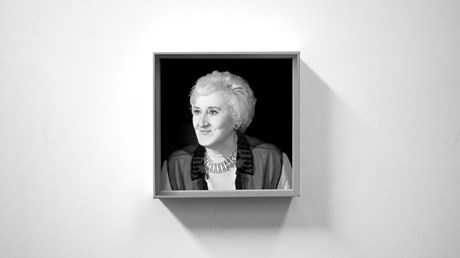|
A number of high-profile Christians have converted to Roman Catholicism and Eastern Orthodoxy. What is driving them away?  In recent decades, there has been a significant and sustained trend of Protestants converting to Roman Catholicism and Eastern Orthodoxy. The most notable figure recently is J. D. Vance, the vice-presidential running mate of former president Donald Trump. But he’s not alone. Vance is just one name in the growing list of high-profile, theologically conservative Christians who have made public shifts away from their Protestant backgrounds (often evangelical) to these more liturgical or “high church” traditions. A previous president of the Evangelical Theological Society, Francis Beckwith, became a Catholic in 2009, and former Anglican Bishop Nazir Ali, has lately returned to the Catholicism of his youth. Other recent Catholic converts include Cameron Bertuzzi of Capturing Christianity (a popular YouTube channel), historian Joshua Charles, and John Richard Neuhaus, founder of First Things journal. Past prominent converts to Eastern Orthodoxy include Hank Hanegraaff (the “Bible Answer Man”), Lutheran scholar Jaroslav Pelikan, and English bishop Kallistos Ware. Of course, there are always exceptions to every trend—as is the case with former Eastern Orthodox priest Joshua Schooping, author of Disillusioned: Why I Left the Eastern Orthodox Priesthood and Church, and the Catholic-turned-Protestant Chris Castaldo, who published Why Do Protestants Convert? with Brad Littlejohn last year. This phenomenon appears less notable in nondenominational churches, since a previous CT article reports that former Roman Catholics have gone from comprising 6 percent of unafilliated congregations to 17 percent in the past 50 years. Also, a 2014 Pew Research Center study highlighted a reverse trend of Catholics converting ... How Jesus and the Powers, cowritten with Michael F. Bird, calls Christians into the political sphere.  In a year seeing over 50 countries at the polls—half of which could shift geopolitical dynamics—the timing of Jesus and the Powers’ release was no accident. A few years ago, N. T. Wright (author of Surprised by Hope) and Michael F. Bird (Jesus Among the Gods)—who had collaborated on The New Testament in Its World—realized there was a lack of biblical guidance on how Christians should engage with politics, and they decided to do something about it. “We both had the sense that most Christians today have not really been taught very much about a Christian view of politics,” Wright said. “Until the 18th century, there was a lot of Christian political thought, which we’ve kind of ignored the last 200–300 years—and it’s time to get back to it.” The “gateway” to political theology, Wright believes, is the idea that, until Christ’s return, “God wants humans to be in charge.” And while all political powers have in some sense been “ordained by God” according to Scripture, he says, Christians are called to “take the lead” in holding them accountable. “The church is designed to be the small working model of new creation, to hold up before the world a symbol—an effective sign of what God has promised to do for the world. Hence, to encourage the rest of the world to say, ‘Oh, that’s what human community ought to look like. That’s how it’s done.’” And as the global church becomes “a community worshiping the one God and doing justice and mercy in the world,” this is a “sign to the caesars of the world that Jesus is Lord and ... Global Christian organizations scour the world in search of the best conference sites.  This September, about 5,000 Christians will assemble in Incheon, South Korea, for the Lausanne Movement’s Fourth Congress on World Evangelization. Some of them wish Lausanne had picked a location with a better exchange rate and lower hotel prices near the conference venue. However, local costs are just one of many considerations when global Christian organizations select a conference site. Beyond the common refrain about the shift in Christianity’s center of gravity, numerous other factors have pushed most major global events toward the Majority World, especially Asia. CT asked leaders of prominent Christian international entities to talk about their site selection process. Their answers depict the complex logistical, diplomatic, and interfaith issues involved in bringing Christians from all over the world together in one place. For most conference organizers, the single most important concern is choosing a site that everyone can come to. Due to complicated international relations and many affluent countries’ concerns regarding visa abuse, this is a major challenge. “Whether people from Global South countries could get visas was our number one question,” stated Samuel Chiang, deputy secretary general of the World Evangelical Alliance (WEA), who planned the Future of the Gospel Forum in Istanbul last year. “Canada and the United States accept visitors from about 70 countries without a visa, which sounds like a lot until you are trying to bring people from 200 countries.” Difficulties in obtaining visas were a key reason why Africans were underrepresented at the United Methodist Church’s General Conference in Charlotte, North Carolina, this year. Their absence affected the vote that ... Jesus told us not to worry, but worry is our culture’s parenting default. It’s harming our kids.  As my daughter dangled 10 feet above the ground, legs wrapped around the thick, smooth trunk of a vine in the middle of the Belizean jungle, I stood below her and considered how far she was from solid ground, a paved road, and the nearest hospital. Needless to say, this had not been on my agenda for the day. We were visiting a small village on a mission trip to western Belize with friends from our church who’ve been coming annually to the same town for more than a decade. Our task was to help in the village school, support community development projects, share the love of Jesus, and deepen friendships with people who live in a totally different cultural context from our own. It was that last part that put my daughter up the tree. We took a morning walk to see some little-known Mayan ruins but detoured to a no-safety-harnesses jungle adventure course led by Crocs-wearing Julio, our local friend who clearly didn’t find it worrisome to let a child free climb. Back home in the States, we’re constantly worried about our kids. It’s well-documented and generally accepted that smartphones, social media, and a lack of childhood independence and free play contribute to creating what social psychologist Jonathan Haidt famously dubbed an “anxious generation.” But in all this collective handwringing, we tend to overlook a closely related and equally pervasive problem: unchecked, socially normalized parental anxiety and the smothering parenting style it produces. There’s nothing new under the sun, and I’m sure, to some extent, that’s true of parental worries. Throughout the ages, parents have feared losing their children to sickness, accidents, or violence. Right ... Natural disaster costs have overwhelmed the market for carriers, which are raising rates or dropping policies for congregations in high-risk areas.  John Parks was taking his first sabbatical in 40 years of ministry when he got a call from his church’s accountant with some bad news. Church Mutual, the church’s insurance company, had dropped them. “This does not make sense,” Parks, the pastor of Ashford Community Church in Houston, recalls thinking at the time. “We’ve never filed a claim.” Five months and 13 insurance companies later, the church finally found replacement coverage for $80,000 per year, up from the $23,000 they had been paying. “It’s been an adventure,” said the 69-year-old Parks from his home in Houston, where the power was out after Hurricane Beryl. “That’s putting it politely.” Parks and his congregation are not alone. An ongoing wave of disasters—Gulf Coast hurricanes, wildfires in California, severe thunderstorms and flooding in the Midwest—along with skyrocketing construction costs post-COVID have left the insurance industry reeling. As a result, companies such as Church Mutual, GuideOne and Brotherhood Mutual, which specialize in insuring churches, have seen their reserves shrink. That’s led them to drop churches they consider high risk in order to cut their losses. Hundreds of United Methodist churches in the Rio Texas Annual Conference learned they’d lost property insurance in November last year, leaving church officials scrambling. More than six months later, some churches have found new insurance, often at a steep increase. Others still have none, said Kevin Reed, president of the conference board of trustees. Reed said the conference had about a month’s notice that its property insurance policy, which local congregations could buy into, was being ... How athletes are sharing their faith and pointing to God.  For most spectators, the Olympics are a display of the highest level of athletic skill. But for many Christian athletes, they provide an opportunity to express their faith to each other and to the world. Furthermore, a shared faith brought athletes together with teammates and across nations. This group of Olympians from Australia, Nigeria, Portugal, and other countries sang “Waymaker” in a video posted by Cindy Sember, a British hurdler, who praised God for the other Christian athletes she met at the Olympics. Soon-to-be gold medalist Yemisi Ogunleye (more on her below) and silver medalist Malaika Mihambo sang “Gratitude” while their coach, Ulrich Knapp, played guitar and harmonized. The athletes posted the video shortly before the shot put and long jump events, crediting the song with preparing their hearts and minds for competition. Below are more of the most memorable moments of Christian expression at the Paris Olympics. Gospel Music Invades Press Conference after German Christian Wins Shot PutGerman shot-putter Yemisi Ogunleye got off to a rough start in her competition on August 9, slipping and falling in rainy conditions on her first throw. Despite a sore knee, Ogunleye recovered with an excellent second throw to qualify for the finals and was in second place entering her last attempt. She rose to the occasion with a throw of exactly 20 meters (65 feet, 7.5 inches), her best ever in outdoor competition, to win gold. Asked how she approached that decisive final throw, Ogunleye replied, “Before ... I never thought I’d be a homeschool parent, not least because I support public education. An improbable shift changed my perspective.  I am an educator. I believe in the good of education for everyone and that public schools should be amply funded and resourced. I believe in contributing to the common good even when it doesn’t directly benefit me. And in the summer of 2020, my wife and I found ourselves in what I’d once have called a most improbable situation: We became homeschool parents. Let me explain. One of the attractive parts about moving to Abilene, Texas, five years prior was the well-loved public school system. We bought our house near one of the many excellent elementary schools and expected an ordinary educational path for our two children. We’ve long known public school teachers, happily paid taxes for schools our children didn’t attend, and looked back fondly on our own days of bus rides, locker conversations, and school cafeterias. Then COVID-19 came. Suddenly, we realized our our oldest would be going to kindergarten masked, unable to see his teacher’s face, distanced from other children—or else staring at a screen for hours a day in virtual kindergarten. Guidance from the school board was minimal, and the deadline to register our child for COVID kindergarten ticked ever closer. We couldn’t do it—but we realized we could handle homeschooling, at least for a while. Both my wife and I could do some of our work remotely, and we could convert part of our living room into a classroom. It would be hard, but we could make it work. “One year,” we said. “We can do one year.” Let me say, now, that making this decision was not a brave one. It was simply the only one we felt was available to us. Had COVID not forced our hand, I’m not sure we’d ever ... The raised index finger of levitating surfer Gabriel Medina is the latest sign that sports success has made Brazilian evangelicals less marginalized and more confident.  There’s a hidden Christian message behind what may be the most celebrated image of the 2024 Olympics. On July 29, in round three of the shortboard surfing competition, Brazil’s Gabriel Medina faced off against Japan’s Kanoa Igarashi, who eliminated Medina in the last Olympics. In his second wave, Medina emerged from a tube exuberant, with both palms open, suggesting that the judges should offer him a 10 for his performance. (Two of the five judges agreed; his final score was 9.9). Medina then pivoted left, toward the surf, and jumped off his board, raising his right hand and pointing his index finger upward. This was the image that Agence France-Presse photographer Jérôme Brouillet captured. Brazilian evangelicals recognized the sign immediately. “It's like he’s saying, ‘It's not me you should be looking at, it’s God. This moment of glory is not mine, but his,’” said João Guilherme Züge, a resident historian of religion at Museu Paranaense, in Curitiba. In contrast to the United States, where baseball players often point to the sky after hitting home runs for different reasons—some to express gratitude to God, others to honor late loved ones—the gesture among Brazilian athletes has become closely associated with Christian players. The raised finger, pointing to the sky, has been the trademark of Brazilian evangelical athletes for more than 40 years, one of numerous public displays of faith following competitive glory that have helped to affirm and establish evangelical identity, especially when the movement was still in its infancy. No one seems to remember who initially created the gesture, but it gained popularity in the 1990s, ... Evangelical leader Erwan Cloarec shares his reactions to the opening ceremony, why he is enjoying the games, and how he hopes the church is seizing the moment to live out its faith.  On Sunday, at the start of the second week of the Olympics, France won its 44th medal, surpassing its previous record total for a modern Olympics. Few might have predicted either the country’s extraordinary athletic success or the this national joy, which seemed in short supply after contentious snap national elections in June and July. But for some French Christians, negative feelings emerged again following the controversial opening ceremony. Erwan Cloarec, president of the Conseil National des Évangéliques de France (CNEF), noted this “distress” last week in a statement, adding that he and the director general of CNEF would be meeting with the Central Office of Religious Affairs at the Ministry of the Interior that day to advocate for a “secularism which makes room for everyone” and for “state guarantees that all, believers or not, will be respected in their essential convictions.” Cloarec pointed out that many Christian ministries had spent months anticipating that the Olympics would offer them an opportunity to live out their faith to the thousands descending upon the city. Through Ensemble2024, evangelical congregations and ministries have organized community tournaments, a K-Pop worship service, an exhibition examining the intersections of body, sport, and spirituality, a day of surfing, and a praise festival, as well as handing out water bottles and hygienic products. They have also provided chaplains to athletes and offered opportunities for Christian athletes to share their testimonies. “Let us see in the situation that has arisen a real opportunity to bear witness to our faith while the person of Christ has just been placed at the center of these games,” ... For more than 70 years, Brougham used Studio Classroom and her trumpet to introduce Taiwan to Jesus.  Doris Brougham, an American missionary, who for 70 years used English and music to share Christ with millions of Taiwanese people, died Tuesday at the age of 98. Brougham’s contributions to Taiwan led her to receive its highest civilian award, the Order of the Brilliant Star with Violet Grand Cordon, in 2002. Last year, then-president Tsai Ing-wen made an appearance on ORTV’s show Studio Classroom to hand-deliver Brougham a Taiwanese passport, a special honor given 72 years after she first arrived in Taiwan. “Her story brings tears to [my] eyes,” wrote former Taiwanese president Ma Ying-jeou in the preface of the 1998 Chinese-language biography on Brougham. “She is the English teacher of 20 million people [the population of Taiwan], cultivating countless professionals in the English education field. ... How many people have listened to her broadcasts and read her articles? Surely more than 20 million.” While, today, Brougham is the most well-known American in Taiwan—where Christians make up 7 percent of the population—she never planned to come to Taiwan in the first place. The missionary’s initial aim was to minister to mainland China, but the Chinese Civil War forced her to change plans and move to Taiwan (then called Formosa). Her love of music led her to start the first Christian radio station, the beginning of what ... |
Site Mailing List
A Family Church for the "Whole" Family Christ View Church Copyright 2004 © Christ View Church. All Rights Reserved. Powered by Sitebuilder
|







